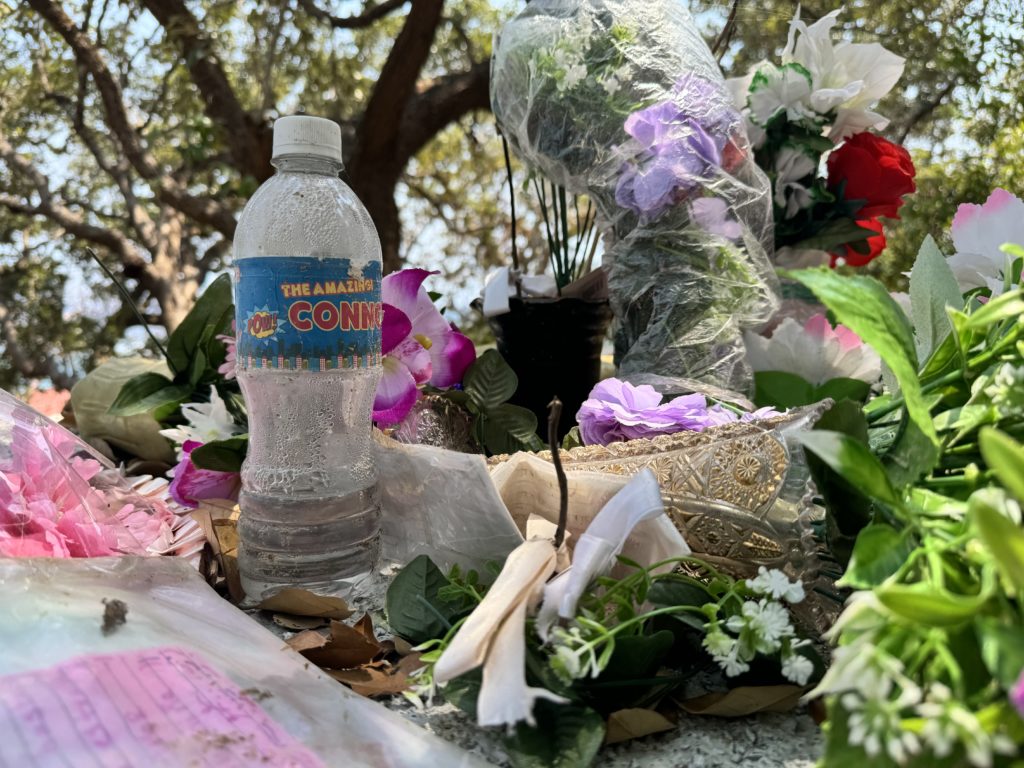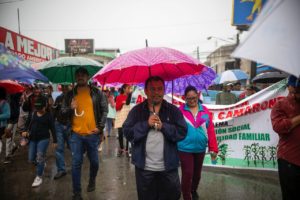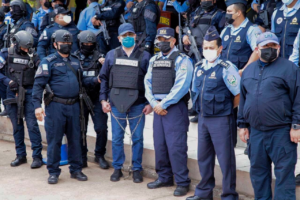Text: Jennifer Ávila
Photography: Catherine Calderón
“Innocent!”
After hearing those words, Ovania screams, cries and hits herself and Gilbert Reyes, a U.S. citizen and the man who murdered her niece Nikendra and two of her friends, María and Dione. She hits herself and Reyes hard, and wakes up agitated and in pain.
It’s been four months since the women were found dead in the French Harbour neighborhood in Roatán, northern Honduras; and it’s only been a few weeks since the suspect of committing the triple femicide was arrested in the Dominican Republic after fleeing from the island, where he had lived for four years. Since his arrest, Ovania has had a recurring nightmare: Reyes is put on trial but found innocent.
It’s quiet at the restaurant where Ovania works in West Bay, the most popular tourist site on the island. Customers haven’t arrived yet, so we take a seat in the middle. There, Ovania tells me about the nightmares that started after January 8, when she realized that Nikendra was not coming home.
That Sunday, Nikendra, María and Dione went out with Gilbert Reyes, Dione’s former partner and father of her four-year-old son. In Roatán, an island of 83 square kilometers with a population of about 70,000 inhabitants, most people know each other, and it’s not uncommon to run into acquaintances at bars, nightclubs or on the streets, or to have jobs, which are scarce, in the same industry. So, several acquaintances say they saw Reyes with the three women that night, first in Punta Gorda and later at the Blue Marlin Bar in Coxen Hole.
She tells me about her recurring nightmares since January 8, when she realized that Nikendra was not coming home.
By morning, they had not returned home. Dione’s and Nikendra’s mothers would often take care of their grandchildren, and they knew something was wrong because their daughters never spend the night somewhere else, much less without calling. María’s mother called her repeatedly at 1 a.m. because her newborn baby wouldn’t stop crying. But she didn’t answer the phone.
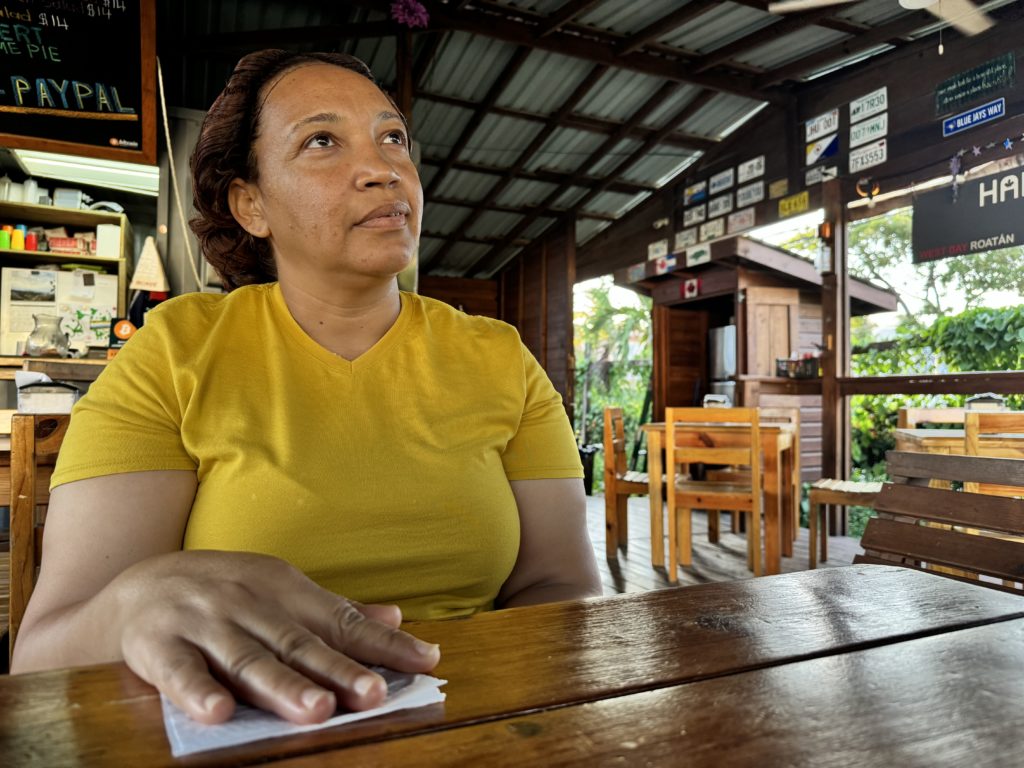
Ovania relates the day she last saw Nikendra and the following one, when time seemed to have stopped while looking for her. In her account, she recalls how Nikendra came into her life and the horror of losing her.
Nikendra was raised in two homes, one next to the other. Ovania’s mother, her twin sisters Johanna and Jovanna, a cousin and her husband live in one of them. Nikendra was brought here as a newborn. Her father is one of Ovania’s brothers, and her mother is an Indigenous Miskito woman who had migrated to Roatán. Neither one of them took good care of the baby, Ovania says.
One day, a neighbor called Ovania to tell her that little Nikendra wouldn’t stop crying and had been alone in the house for hours. Ovania and her sisters entered the house and took the baby. The mother asked them to keep Nikendra because she couldn’t take care of her, and her father was not around.
Ovania’s memory of the time she rescued Nikendra is ever-present in her account; it’s a reminder of the pain she feels for not saving her again, especially on January 8, 2024, the day she looked for them, hoping they’d be alive.
Ovania says that when Dione’s and María’s mothers realized they would not be coming home after a night out together, they decided to look for them. They first went to the Centro Integrado Expedito de Justicia (CEIN), an empty building in French Harbour – a community in the middle of the island and a place with little touristic infrastructure where small fishing boats dock.
But it would be an overstatement to say that CEIN has investigative police officers, prosecutors and medical examiners, and that citizens can file complaints there. Relatives of the women went there together to file a report, but police officers said they had to wait 24 hours to do so.
“‘They’re probably just drunk somewhere,’ police officers say to people who are looking for their children,” said Ovania and recalled telling the officers, ‘I’d rather look for them, and if they’re drunk, we can laugh about the situation later, but we have to look for them.’”
A prosecutor from CEIN took their statements, but they were slow to act. By 9 a.m. they had received help from relatives, neighbors and reporters from local news outlet Roatán Hable Claro – who posted pictures of María, Dione and Nikendra on social media and reported their disappearance.
“‘They’re probably just drunk somewhere,’ police officers say to people who are looking for their children,” said Ovania and recalled telling the officers, “I’d rather look for them, and if they’re drunk, we can laugh about the situation later, but we have to look for them.”
***
I have to reconcile heaven and hell to describe where I am. Roatán is the largest of three islands constituting the Islas de la Bahía department. This area, abandoned by the State, is known for its natural beauty and coral reefs, which are essential to marine life in Mesoamerica and whose natural abundance has been exploited by the tourism industry and foreigners – many of whom have summer houses here and own that industry as well as energy power plants and potable water. Others, both Hondurans and foreigners, control the drug trade, human smuggling networks, prostitution and smuggling of natural species from around the country.
Roatán embodies the most brutal form of extractivism I’ve seen in Honduras; everything is exploited: the sea, natural gas, sunlight, the territory, Garífuna communities, Miskito fishermen, women and girls. And it all goes unnoticed because no one wants to taint the postcard image of a small paradise.
Many things happen in Roatán, but compared to mainland Honduras, it’s still a peaceful place. Deputy Commissioner Leiva says reckless driving on motorcycles is the most common form of offense on the island, and proudly showed me dozens of seized motorcycles as proof of his effective work.
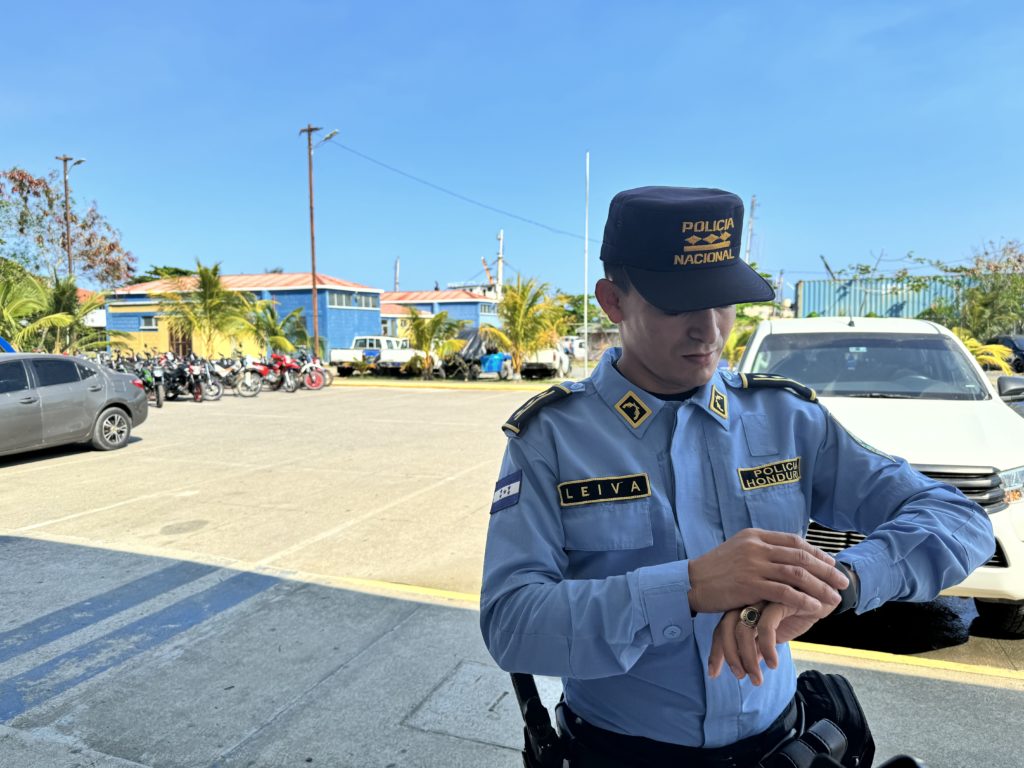
In 2023, Islas de la Bahía, a department comprising three major islands, was the second least violent, and 24 of 29 homicides took place in Roatán. By May 2024, 12 homicides, including the murder of four women, had occurred, according to Honduras’ Police Statistic System (SEPOL).
Concerning domestic violence, Leiva says they probably receive three complaints a week, and now there are more women in the police to address this problem. In response to recent cases, the police recruited 70 police officers in Roatán, increasing the number of officers to 235, and the police is now under the leadership of a woman, Deputy Commissioner Nazareth Posadas.
But more men are carrying guns in Roatán, the incidence of domestic violence is high and there is little trust in the police to file complaints. Locals have the impression that foreigners are overprotected, and this brings about a greater feeling of abandonment among islanders. “In Roatán one is worth nothing without a prestigious last name or wealth,” Ovania says.
In recent months, the disappearance of Angie Peña, a young Honduran woman who went missing while jet-skiing, has been widely reported in newspapers and gave rise to all kinds of conspiracy theories. The investigation that ensued began uncovering what had been happening on the island for a long time but was kept a secret: human smuggling and sexual exploitation, both fueled by authorities’ complicity.
“I hope they find Angie alive because that’s what I hoped for while looking for Nikendra,” says Ovania in tears.
On January 8, while they were trying to file a missing report to CEIN, someone called Dione’s mother, Thelma, to tell her Gilbert Reyes was at the airport and flying to Miami that day. Ovania, her sisters and Thelma, asked prosecutors to interrogate the suspect, but they had to wait 24 hours, they said.
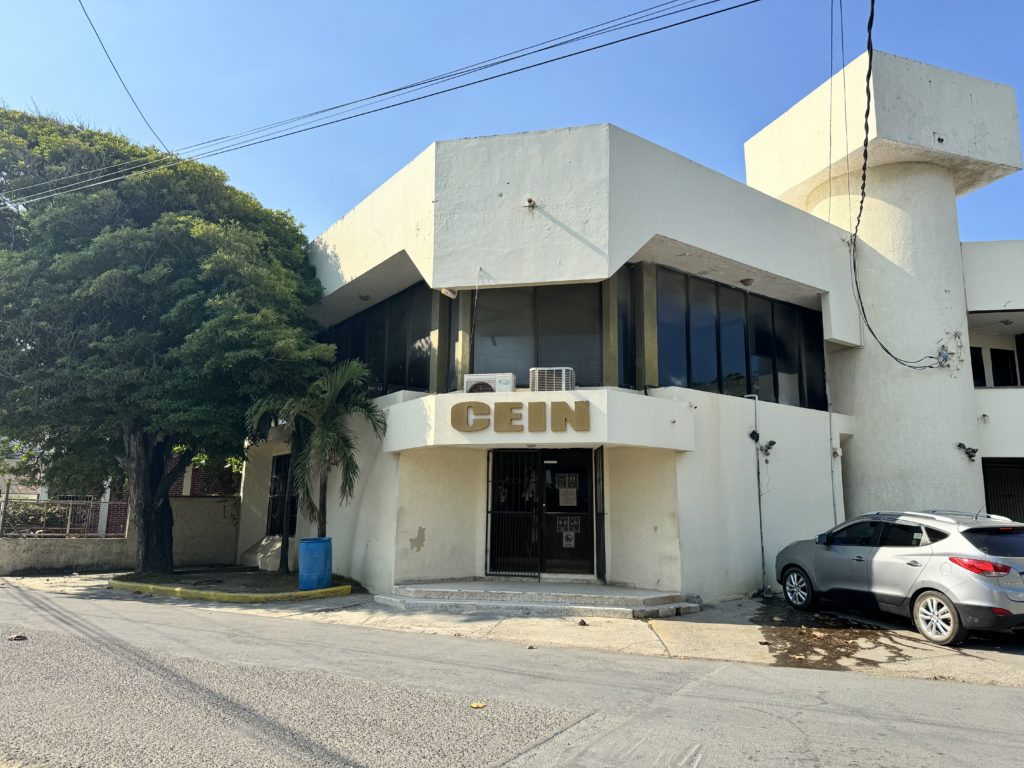
They went to the airport and told security personnel they just wanted to ask Reyes what happened the night before, and only he could answer, begging them to be allowed through. Hours went by, and they felt desperate; the only person who could know the whereabouts of their daughters was there waiting to catch a delayed flight to Miami.
That afternoon, neighbors and relatives started looking for the women, and the police finally reacted. In the evening, three dead bodies were found in a black vehicle. It was Dione, Nikendra and María. But it took a day to corroborate this since authorities acted slowly. By the time they removed the bodies, Reyes had arrived in the U.S, and he had already fled to the Dominican Republic when medical examiners determined the cause of death: a shot to the head.
“Dione is standing on tiptoe on a chair; she is screaming and asking for help in what seems like a chasm. Although I cannot help her, I tell her she has to escape. I look at her as she falls. Then, I don’t see her anymore and I feel a sharp pain. I wake up because my abdomen hurts. She’s dead; my daughter is dead.”
Every day is the same, says Thelma. She feels as if she were locked in a dark room, like the one Dione couldn’t escape from in her dreams the day she didn’t come back.
She reproaches authorities for not telling her in what state the women were found; if they were naked or decomposing since relatives were not allowed to see them.
“‘My father killed my mother,’ Dione’s son tells me every other day when we visit her grave. It breaks my heart,” says Thelma, while Gilbert, 4, plays with nuts that fall from palm trees, which surround his mother’s grave.
The cemetery, which is about 10 meters away from their home, is like their backyard. When Gilbert, Dione’s youngest son, looks for his mother, he quickly runs to her grave. Gilbert’s older brother, 9, sometimes accompanies him, but he’d rather not talk to his mother or about her, and he rarely looks at the grave.

Dione had been on the island for a month after working seven months in a pizzeria in Alaska. She was happy and excited about starting a new life when she returned, her parents told me. They have pictures that Dione sent from Alaska, smiling, with an afro, and wearing fashionable winter clothes. “She loved to dress well and always wanted to see the snow,” Thelma says while showing me WhatsApp statuses, videos and pictures of Dione.
Dione’s father keeps the last messages from her daughter telling him she was going to leave Reyes. Those messages came from an empowered woman who wanted to get ahead in life with her sons. She asked her parents for support and understanding, and dreamed of a future without violence from her then partner, the man who would take her life.
Thelma Dixon says every day is the same. She feels as if she were locked in a dark room, like the one Dione couldn’t escape from in her dreams the day she didn’t come back.
During that month in Roatán, Dione helped Nikendra, her best friend and neighbor since kindergarten, with the paperwork to request the same work visa. They wanted to go together and send money to their families, especially their children.
The day Dione and her friends went out with Reyes, Dione’s brother also came along, but got separated from the group and joined his cousins. Thelma says her son feels reproached.
Relatives are broken and burdened by guilt for not accompanying them at the very end; for helping Reyes when he was unemployed; for interceding on his behalf when Dione threatened to leave him and never come back; for angering him when they asked him not to bring guns to the house or for telling him they would take care of the baby. “Gilbert killed all of us; he killed her and us too,” Dione’s father said as he pointed to his wife and himself.
Thelma showed me her house, which is right next to the one Reyes had bought for Dione and their children. It’s empty now, and they don’t know what they’ll do with it. Thelma’s house was being remodeled, but since Dione’s murder, renovations have been discontinued. The new part of the house, the second floor, was meant to be Dione and her children’s home: two rooms, a bathroom, a living room and a balcony with a view of the sea. “Mom is up there with Jesus,” says Gilbert as he stands on the balcony and points to the sky, which blends with the water in a bright turquoise, calm seascape.
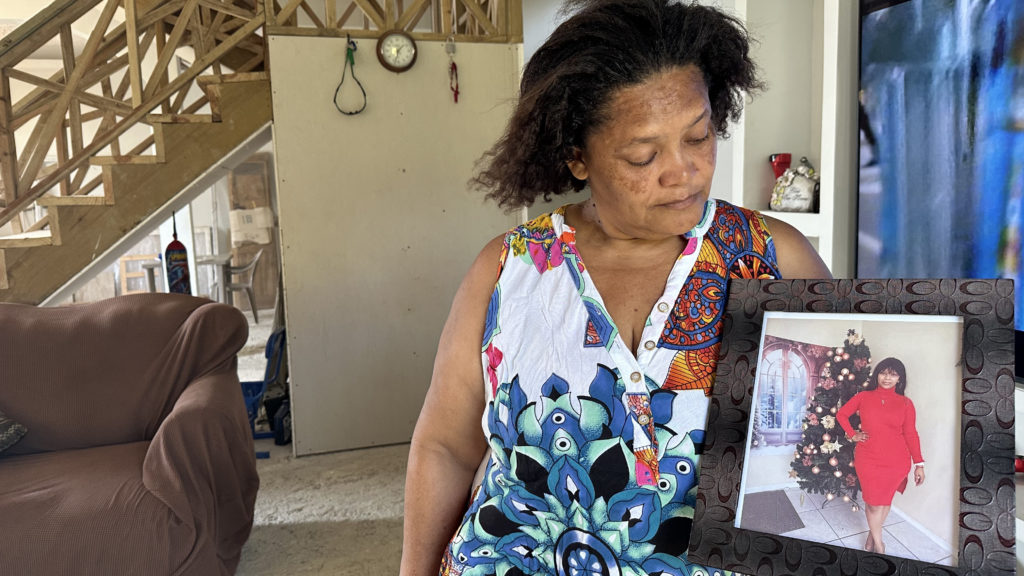
Femicides are rampant in Honduras. During the administration of Xiomara Castro, the first female president, the country has faced a wave of violence against women. Since Castro took office in 2022, 769 women have been murdered, and 77,585 complaints of domestic violence have been received by emergency services, according to the Center for Women’s Rights (CDM).
Displaying pragmatism that borders resignation, Secretary of Security Gustavo Sánchez says it’s a cultural problem. But the State could step up its efforts by preventing a survivor of domestic violence from becoming a victim of femicide or by promptly searching for a missing woman to save her life.
Ovania hopes there will be changes to the law, allowing authorities to search for persons as soon as they go missing, as it’s common in other countries, without having to wait 24 hours; and establishing shelters for domestic violence survivors so they don’t have to go home to a violent partner.
The State could also look after the collateral victims of femicides, for example, providing mental health care for orphans, like the children of Dione, Nikendra and María, five children who have lost their mothers. Ovania wants this for Honduras, but before fighting for it, she wants justice.
“People should know more about abuse; there are women who are going through this, and don’t know it. Maybe Dione thought they would find reconciliation that night, and he had it all planned: he was prepared; he had his passport and knew what he was going to do,” says Ovania, who was also a victim of domestic violence.
It’s surprising how suffering brings so many women from different backgrounds and places together. When a woman tells you “I’ve also been through that,” that’s empathy, but it also reveals how common violence has become. Sometimes they don’t say it aloud. How many women nod when they are listening to a rape survivor? How many women have been blamed when they file a child support claim, and are revictimized by the justice system? How many women have been told when filing a complaint of domestic violence to show their bruises and wounds, and that without signs of blood the aggressor cannot be stopped.
“I tell women in Honduras to be brave. It’s not necessary to suffer abuse, and they have a life ahead of them. They are beautiful, young and intelligent, and they might think they’re in love, but if one puts up with violence, that’s not love. I have lived through domestic violence with a former partner, and tried to report him. They said I had to show visible bruises to proceed with the complaint, and I told them: ‘The day he kills me I won’t come here because I’ll be dead.’ My brother got me out of there. It happened to Nikendra too, and we got her out of there and supported her,” Ovania said.
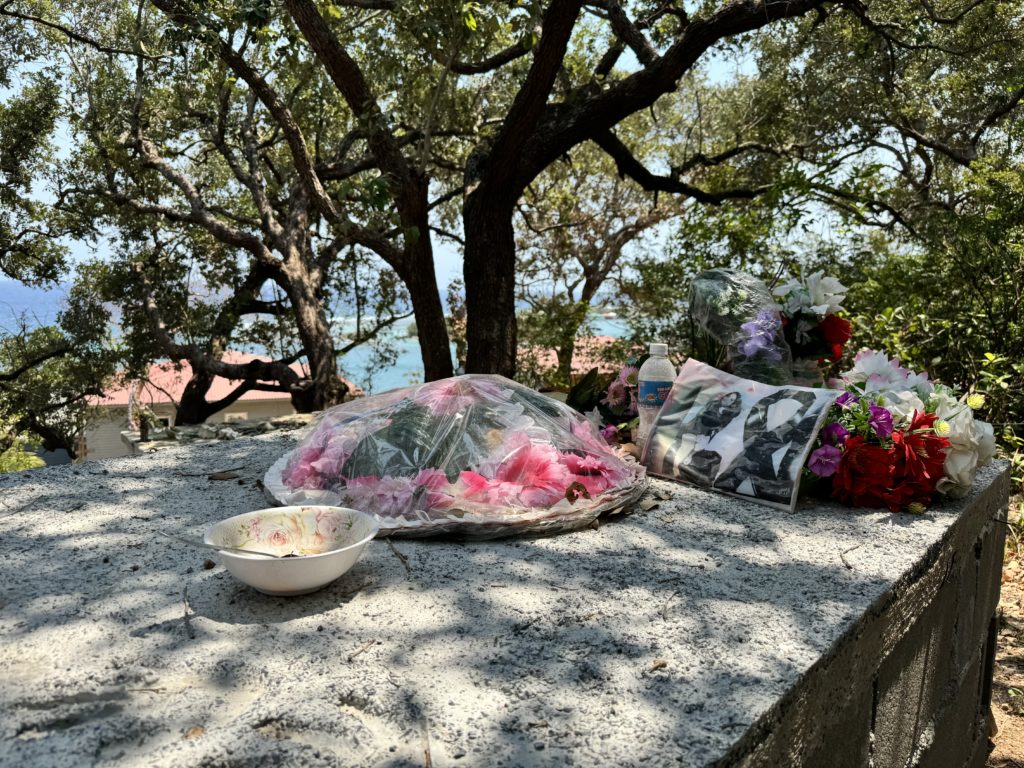
The day people on the island heard of the triple femicide “we were all on the same team,” said Ovania. People looked for them, demanded justice and raised their voices. Gilbert Reyes’s arrest was celebrated as a small victory in her community. But there were people and news outlets promoting the same old narrative: “It was a crime of passion, an isolated case, and this is not common on the island.” The case was seen as “personal” since she had filed a complaint against him, and so did he over “stolen money.” But when are we going to stop minimizing and justifying violence if “personal matters” can lead to a triple femicide?
The image of Roatán as a paradise where nothing bad happens is promoted by the tourism industry, in which Nikendra used to work taking foreigners on canopy tours. Ovania also works in that industry in a restaurant, whose owner is a foreigner, in the most popular tourist site of the island.
Ovania and the relatives of the other victims demand that Gilbert Reyes be put on public trial in Roatán and to send a message when he’s found guilty: no woman should be murdered, not in Roatán or in the rest of the country.
Defense Attorney Marlon Duarte says the evidence points to Gilbert Reyes’s direct involvement in the triple femicide.
“The suspect has not acted appropriately; he has tried to flee and has not been present in the proceedings which is why he should be detained. Once he’s indicted, we expect to move forward with a public trial because that’s what the population of Roatán wants,” Duarte said.
He further explains, “Criminal proceedings will be followed by a civil lawsuit, whereby we’ll pursue property of this person in compensation for damages caused to the relatives of the victims, including their children. This compensation is meant to cover the costs of education, child support, medicine and any other reasonable compensation under civil law since reparations for such atrocious actions are not possible. Hondurans deserve swift and effective justice, and this should be clear to those attending the trial.”
Gilbert Reyes is now awaiting an extradition hearing in the Dominican Republic.
Ovania and Thelma say there’s more to this case because Reyes murdered three young women and fled the country. How could he go to the U.S. and then to the Dominican Republic without being arrested by Interpol? How could he leave Roatán so casually after murdering three women and hiding their bodies? Ovania believes there are accomplices; she’s not settling for a simple explanation of the murders.
There are witnesses who will clear many doubts about Reyes’s involvement in the murders, but accomplices, if any, have not been identified yet, Duarte says.
“Witnesses will be summoned, and they won’t need protection since, as we know, the island is safe. These are sporadic acts that should not tarnish good work done by authorities to preserve tourism and security. While it’s true that there have been cases of sexual exploitation, they’re sporadic. We’re trying to establish a legal precedent: if a person commits such a crime, we’ll do what is humanly possible to stop them,” Duarte added.
Since finding the bodies inside a car, Ovania has looked up similar cases on Google. She wants to know what a body in a stage of decomposition looks like after a given number of hours and at a given temperature. She inquires whether there are any differences when the victim has dark skin. And she asks herself if Reyes drugged them or if he used chemicals to speed up decomposition.
No matter where Ovania looks, she cannot find any answers. Her mind is occupied with all sorts of questions, some of which are just a respite from the fact that Nikendra is not around anymore throwing tantrums or worrying about owing the neighbors 200 lempiras. Ovania laughs when she talks about her niece’s personality: she had a wild side and was a dreamer who was easily stressed but would also get excited about the little things.
Ovania has an instinct for protecting others that gets the better of her. She has seen many vulnerable children wandering the beaches and being abused by tourists who come and go in cruise ships. She has tried to help them by starting support groups, demanding more commitment from parents on the island, a place she loves dearly but also grieves deeply for.
“I want justice for every woman who has been murdered; it doesn’t matter who they were or what they did because we all have the right to live,” Ovania says.
Contrasts on the island are so stark that some of them border on fantasy. Roatán is also a refuge for foreign-born millionaires who want to prolong their lives indefinitely. I spent a couple of days in an Economic Development and Employment Zone (ZEDE), where a city is being built in which people will try to stop aging. “Death is merely an option,” their slogan says. This prompted one last question for Ovania.
“What do you think of the city that’s being built on the island where people say death is optional? Does that mean people will stop aging?”
She looks up as if we were talking about a city high up in the sky, on Mount Olympus, and laughs: “Yeah? And have eternal life in this world we’re living in?”
That’s how it is in Roatán; contrasts are stark, crude and surreal.

